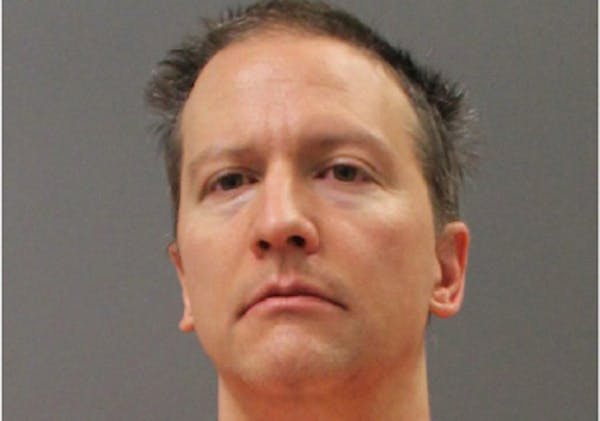He sees George Floyd everywhere he goes.
Nearly a year after watching him die, Donald Williams is still reckoning with his role as a bystander in the most famous case of American police brutality in modern times.
"I look to my left, I see George Floyd," he said. "I look to my right, I see George Floyd. I look somewhere else and it's like I'm always remembering."
He sees Floyd's pictures on buildings. He sees Floyd's pictures on yard signs. He sees stories of his killing all over the news. "I'm always going to have a remembrance of it."
Williams' testimony helped convict former Minneapolis police officer Derek Chauvin of murder and manslaughter in Floyd's death. The trauma of what the witness saw one evening on May 25, 2020, has yet to recede.
He said he stopped at Cup Foods in south Minneapolis for a drink after going fishing with his son when he noticed several police cars outside. Williams saw an anguished Floyd trapped under Chauvin's knee and joined a group of horrified onlookers.
A professional mixed martial arts fighter, Williams urged officers to check the suspect's pulse, told Chauvin he was killing Floyd and repeatedly called him a bum as he desperately tried to make him relent. Finally Williams dialed 911 and said he had witnessed the police kill a man who was in handcuffs.
On the stand last month, Chauvin's attorney Eric Nelson sought to portray Williams as angry and threatening — playing into what critics saw as the racist trope of the "angry Black man" — and recited the expletive-laden insults he lobbed at the officer. Williams at first testified that he got angrier at the scene, but resisted Nelson's repeated attempts to depict him that way during further questioning.
"You grew angry, right?" Nelson asked.
"Uh, I grew controlled and [professional]."
Later, Nelson said, "Those [insults to Chauvin] grew more and more angry. Would you agree with that?"
"They grew more and more pleading for life."
Soon thereafter, Nelson asked, "It's fair to say you grew angrier and angrier?"
"No, I grew professional and professional," Williams said. "I stayed in my body. You can't paint me out to be angry."
He told the Star Tribune that the defense's tactic was "disgusting." Williams was also prepared for it. He had been labeled that way his whole life: as an angry Black child, angry Black teen, angry Black man, and angry Black father.
"And I was now being painted as an angry Black witness," said Williams. "It's like, go ahead, keep on adding to it."
He said he came to tell the truth and felt attacked on the stand.
"I've been in a battle my whole life as a Black man ... He was not going to break me," said Williams. "I'm unbreakable."
Williams said he learned to be adaptable and not let people silence him, adding, "I'm a man of adjustment, and that's why I was able to adjust under fire with him saying that to me."
Several witnesses testified about their guilt over Floyd dying in the encounter. But Williams said he believes he did what he could have done at the scene.
"I won't guilt myself for Chauvin's murderous actions," said Williams. "I won't allow it."
Still, the pain of Floyd's killing has not left him.
"It's traumatizing," Williams said. "It's traumatizing and I'm dealing with it. The whole situation of it is traumatizing. ... I deal with it on a daily basis."
As the jury came back with the verdict, Williams and his young son and daughter waited together.
Well before Floyd's death, he had talked to them about police brutality and the threats they faced, passing on the same lessons that his parents did to him. So the killing Williams witnessed wasn't so much a new learning opportunity for his children as it was an example of what he had been trying to warn them about all along.
"All this did is put light on the things I have been telling my son about being a Black male and dealing with the police and my daughter about being a Black girl and dealing with the police," said Williams.
Alongside his children, Williams prayed that jurors would see "the light and the real truth" of the killing. That they would trust the footage, not the arguments of the defense.
As a guilty verdict was read, "it was a little bit emotional for my kids and it was emotional for myself," Williams said. "And it was a lot of relief, also."
He wanted Chauvin to face the same sentence he believes a Black person would receive if they killed someone: the maximum. Officers shouldn't continue to kill unarmed people in America, Williams said, and change starts in Minnesota.
"There should be no sympathy on him or any of the other officers involved," he said.
Flanked by Floyd's relatives, attorney Ben Crump called Williams up to the lectern at a news conference following the verdict. The two men raised their clasped hands in victory.
"We love you, Donald," said Crump.
Williams told the Star Tribune that Floyd's family members and the team around him were "rock stars." He recalled that they hugged and thanked him for speaking up, and "it was an emotional situation ... I just embraced it and it was good for me to receive that."
He is still dealing with the global spotlight. Williams was driving several days ago when a stranger rolled up and said he recognized him.
"I just want to thank you," he told Williams.
Maya Rao • 612-673-4210
New Minnesota GOP leaders seek peace with party's anti-establishment wing

Who is Republican Lisa Demuth, Minnesota's first House speaker of color?

Minnesota House GOP, Secretary of State Steve Simon return to Supreme Court
Supreme Court sides with DFL and Simon, says 68 House members needed for floor action

